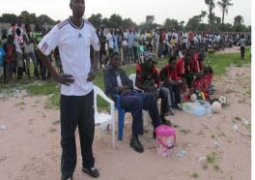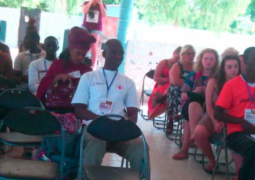It
has been reported that “currently, over 65 countries and territories” around
the world are “battling transmission of the Zika virus”.
The
Zika virus, said to have recently reached Africa, risks spreading to many more
countries in Africa and Asia from other parts of the world, such as Latin and
South America.
Our
Health Ministry on Wednesday briefed journalists about the Zika virus, with the
health communication officer describing it as a disease of public health
importance, although the virus is not present in The Gambia.
Earlier
this year, the World Health Organization declared the virus —mainly spread by the
bite of the Aedes mosquito and sometimes sexual transmission — an international
health emergency.
We
in The Gambia should, therefore, be vigilant and continue our watertight
healthy security and safety measures to prevent the occurrence of any such diseases.
Our
biweekly cleansing exercise must also be seen to be conducted properly to keep
our environment always clean and free from harmful insects, as well as pathogens, which may
cause us serious health hazard.
International
health agencies authorities, such as the World Health Organisation, have stated
that the viral infections of Zika typically occur in tropical climates, and at
present, there is no treatment or cure for the virus.
The
following therefore are some aspects of the diseases as put out by the WHO and
the Pan-American Health organization about the Zika virus.
What
is Zika virus infection?
Zika
virus infection is caused by the bite of an infected Aedes mosquito, usually
causing mild fever, rash, conjunctivitis, and muscle pain.
The
virus was isolated for the first time in 1947 in the Zika forest in Uganda.
Since then, it has remained mainly in Africa, with small and sporadic outbreaks
in Asia. In 2007, a major epidemic was reported on the island of Yap
(Micronesia), where nearly 75% of the population was infected.
On
3 March 2014, Chile notified PAHO/WHO that it had confirmed a case of
indigenous transmission of Zika virus on Easter Island, where the virus
continued to be detected until June 2014.
In
May 2015, the public health authorities of Brazil confirmed the transmission of
Zika virus in the northeast of the country. Since October 2015, other countries
and territories of the Americas have reported the presence of the virus. See
updated list at: www.paho.org/zikavirus.
What
are the symptoms?
The
most common symptoms of Zika virus infection are mild fever and exanthema (skin
rash), usually accompanied by conjunctivitis, muscle or joint pain, and general
malaise that begins 2-7 days after the bite of an infected mosquito.
One
out of four infected people develops symptoms of the disease. Among those who
do, the disease is usually mild and can last 2-7 days. Symptoms are similar to
those of dengue or chikungunya, which are transmitted by the same type of
mosquito. Neurological and autoimmune complications are infrequent, but have
been described in the outbreaks in Polynesia and, more recently, in Brazil. As
the virus spreads in the Americas, giving us more experience with its symptoms
and complications, it will be possible to characterize the disease better.
How
is Zika virus transmitted?
Zika
virus is transmitted to people through the bite of an infected Aedes mosquito.
This is the same mosquito that transmits dengue and chikungunya.
Can
it be transmitted through blood or sexual contact?
In
general, the Zika virus needs a vector (a means of transportation) to infect
people. That vector is the mosquito. The virus has also been isolated in semen,
and one case of possible person-to-person sexual transmission has been
described, but not confirmed.
Zika
can be transmitted through blood, but this is an infrequent mechanism. The
usual recommendations for safe transfusions should be followed (e.g., healthy
volunteer donors).
Can
it be transmitted from mother to child?
There
is little information on transmission from mother to baby during pregnancy or
childbirth. Perinatal transmission has been reported with other vector-borne
viruses, such as dengue and chikungunya. Studies are now being conducted on
possible mother-to-child transmission of the virus and its possible effects on
the baby.
“Zika
is transmitted in a manner very similar to that of Malaria transmission;
through mosquito bites,".
Stephen
Nelson



